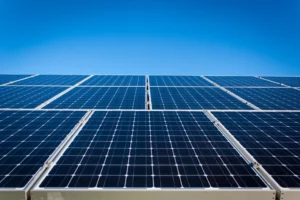With a vision to accelerate the country’s renewable energy usage with solar installations, the government of India has come up with various supportive initiatives. The solar sector in India plays a key role in the country’s shift toward renewable energy, with bold goals set to reach 280 GW of installed solar capacity by the year 2030. To meet the increasing energy demand, earlier governments have come up with supportive policies such as the National Solar Mission.
And, recently, the Indian government has proposed Anti-Dumping Duty on Solar Product Imports. Anti-dumping duties are imposed on anodised aluminium frames for solar panels and modules imported from China. The Aluminium Association of India (AAI) has praised this move as an important step toward building a self-reliant aluminium industry.
In this blog, let’s discuss about this initiative in detail;
Overview of the Proposal
The decision to impose anti-dumping duties was taken by the Ministry of Finance on textured tempered glass used in solar panels. This decision was taken and a complaint was filed by the Solar Ancillary Manufacturers’ Association (SAMA). The government introduced duties ranging from $673 to $677 per metric tonne for Chinese imports and $565 per metric tonne for Vietnamese imports. These duties aim to protect domestic manufacturers, such as Borosil Renewables, from the negative impact of underpriced imports.
The Directorate General of Trade Remedies (DGTR) stated that all the imports, which accounted for around India’s 98% of solar glass demand, heavily undercut local prices. Based on this report, the DGTR recommended imposing duties for the protection of domestic manufacturers and promoting fair competition.
Impact on Imports
The anti-dumping duties have a huge impact on imports. It is highly likely to drive the costs of imported solar products. So, there will be a significant hike in the price of imported solar panels. This is going to reduce the competition for local producers and suppliers.
Therefore, anti-dumping duty raises the cost of solar products, particularly from China and Vietnam, making them more expensive for buyers. Importers will pass on the increased cost to consumers, resulting in higher prices for solar products in the market. They will experience very high retail prices.
Due to this, local producers will face less competition, as imported products become less affordable, allowing domestic manufacturers to capture a larger market share. Hence, the buyers are going to focus more on the local solar products.
Moreover, the duties encourage the growth of the domestic solar industry, as local manufacturers become more price-competitive. So, the country is going to witness a dynamic market shift.
Benefits to Domestic Manufacturers
As discussed above, the Anti-Dumping Duty on Solar Product Imports will be a huge benefit for the local solar companies. They no longer have to deal with heavy market competition and their products will gain necessary attention which will boost demand. Let’s discuss in detail the benefits domestic manufacturers will witness;
The Indian local manufacturers are going to outshine the market, especially those who are focusing on manufacturing solar glass. These manufacturers will witness less price pressure from non-domestic manufacturers. Further, they can now focus on extending their production capabilities. In addition, the domestic manufacturers will do their best to improve their quality standards to boost Indian buyer’s trust in local products. Also, the manufacturers can now meet the growing demand for solar panels more effectively within the country.
The Anti-Dumping Duty on Solar Product Imports is a supportive medium of “Atma Nirbhar Bharat”. This smart move will align with the country’s strategy of self-reliance. India is going to reduce its active dependence on foreign solar imports, by boosting domestic manufacturing. And, this initiative is also going to strengthen the country’s green sector.
Impact on Solar Stocks
The anti-dumping duty on solar products will boost the price of domestic solar stocks due to reduced import competition. The price gain has already been noticed for many solar stocks.
Borosil Renewables’ shares surged by up to 7.8%, reaching Rs 552.50 on the BSE, following the Ministry of Finance’s announcement of a provisional anti-dumping duty.
The duty targets imports of textured tempered coated and uncoated glass from China and Vietnam. It aims to curb unfair trade practices and shield domestic manufacturers from the effects of cheaper imports which led to this stock gain. The shares of the Borosil Renewables are presently trading at Rs. 586.4 up by 2.34% from its previous trading of Rs. 572.95 as of December 10, 2024.
Also, another stock gain is also noticed. On December 10, 2024, Waaree Renewables’ shares were trading at Rs. 3,108.3, reflecting a 4.63% increase from its previous close which was Rs. 2,971.3. The company’s stock price rose at an immense rate after the anti-dumping duty announcement.
It has been announced by the Ministry of Finance that the duty will remain in effect for six months, starting December 4. It will be applied to all glass solar products that are utilised in the solar industry. Therefore, the domestic players will notice great stock gains.
Long-Term Industry Effects
The anti-dumping duty initiative on solar products by the government will greatly foster long-term growth in the domestic solar market. It will fully encourage local manufacturing and reduce dependence on solar imports. Apart from this, there are certain risks and challenges such as over-reliance on local supply chains which can emerge, potentially leading to vulnerabilities if these chains face disruptions or scalability challenges. This is where manufacturers have to balance growth with supply chain resilience for sustained success.
Investment Insights
Imposing anti-dumping duties on solar products will benefit investors. There will be a huge focus on stocks in the domestic solar sector. The country will notice more investments in renewable energy infrastructure and technological advancements. The investors will also support further government initiatives to strengthen the future of solar energy in India. So, the solar industrial sector is going to notice great investments.
Conclusion
In conclusion, the Anti-Dumping Duty on Solar Product Imports will take the solar stocks to the next level and accelerate the demand of domestic manufacturers. Long-term industrial growth along with meeting the country’s sustainable goals will be catered. This initiative is all set to broaden the opportunities, innovate domestic solar solutions, and contribute to the country’s green approach.






